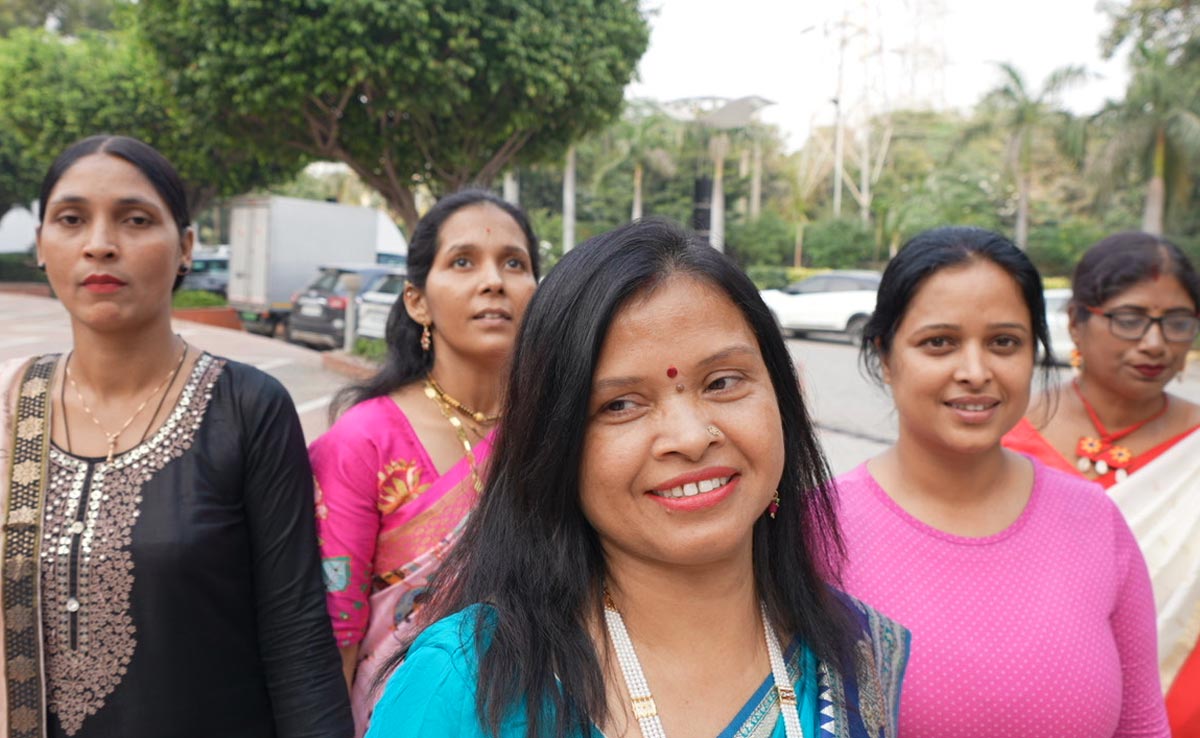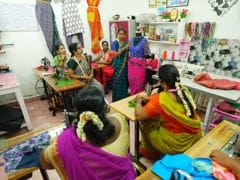- Home/
- USHA Silai School Women's Journey To The Fashion Ramp
USHA Silai School Women's Journey To The Fashion Ramp

Since 2011, the USHA Silai School program has been transforming the lives of women in rural India. Over 1.4 million women have been trained in sewing and stitching, enabling them to create self-sustaining micro-enterprises. For many, this program has been a lifeline, helping them break free from poverty, achieve financial independence, and support their families and communities. The program's success lies in its holistic approach. Women from rural areas, often marginalized with limited earning opportunities, receive classical sewing training through a nine-day intensive workshop.This training led to the establishment of USHA Silai Schools, where women can refine their skills, earn an income, and eventually train others.
Ashutosh Chauhan, Deputy Manager of the USHA Silai School program shared,
Over 36,000 women have undergone classical training and set up Silai Schools. From there, we identify the best talents, provide ongoing training, and prepare them to become master trainers. These trainers also receive life skills training, including financial literacy and sanitation, empowering them to become leaders in their communities.
In a landmark initiative, ten master trainers were selected from across India to participate in the prestigious India Style Fashion Week. These women, who once stitched garments for villagers, showcased their original creations as designers on an international platform. Their journey, guided by mentors and USHA trainers, was marked by dedication and learning.
Mary Rupa Tete, a senior trainer said,
This journey from skilled artisans to designers has been challenging yet inspiring. These women represent true grit and determination.
From Village Struggles To Lakme Fashion Week Stardom: Sunita's Inspiring Journey
USHA brought together talent from across the country through a meticulous selection process. Women from Silai Schools to Master Trainers competed for the opportunity, and ten exceptional women were chosen. For the first time, these women stepped into the spotlight as designers, showcasing their unique creations and celebrating their transformation.
Ashutosh Chauhan, Deputy Manager, USS explained,
We invite women based on their skills. The best are selected and given platforms like India Style Fashion Week, Lakme Fashion Week, and East India Fashion Week to showcase their talent. With input from designers, we train them in pattern making, design development, and measurements, empowering them to excel on prestigious stages.
The transformation of these women into designers was supported by fashion designers Dr. Kapil Kishore and Sonia Jetleey, who mentored them online. From creating mood boards to understanding color balancing and pattern making, the women learned every step of the design process.
Dr. Kishore said,
The concept focused on festive seasons. We started by introducing the mood board and guided them step by step on how to create and arrange it. They learned color balancing and design elements. Once they understood, they selected and incorporated colors to bring their vision to life. The final collection beautifully captures the festive spirit.
For participants like Savita Thakur from Bihar and Ranjhna from Himachal Pradesh, this experience was a dream come true.
Savita said,
I never imagined I'd be here. Seeing my designs on models on such a grand stage feels surreal.
Ranjhna added,
I drew inspiration from temples, mountains, and nature to create my designs. From being a village woman whose work was overlooked, I've become someone whose creations are celebrated. It's a moment of pride and transformation.
A Decade of Transformation: Saroj Namdev's Story Of Sewing Dreams
The India Style Fashion Week in Gurgaon marked the culmination of months of hard work. Excitement filled the air as the final moments approached. Designers made last-minute adjustments, ensuring every garment fit perfectly. When the women's designs finally hit the ramp, it was a moment of triumph. Each step symbolized their courage, resilience, and determination.
For these women, this wasn't just a fashion show, it was a celebration of their journey from marginalized individuals to empowered designers. The event has been a turning point, inspiring participants to aim higher.
Ranjhna expressed her future aspirations,
I dream of taking my designs to platforms like Lakme Fashion Week and creating a brand that represents Himachal and India.
For USHA Silai School, this collaboration is a testament to their mission of empowering women.
Ashutosh Chauhan concluded,
We aim to popularize sewing and provide opportunities for marginalized women to showcase their talents. This is just the beginning.
The India Style Fashion Week wasn't just about showcasing designs. It was a celebration of resilience, creativity, and the power of opportunity. These women have shown the world that with the right support, even the most distant dreams can come true.
Related Stories
More- Team NDTV | Thursday February 12, 2026
From Ladakh peaks to Assam fringes, Usha Silai School trains tribal women in Turtuk, Kargil & Dakhinkuchi—crafting livelihoods with armed forces, NHPC & NGOs. Stitching national resilience
- Team NDTV | Thursday January 29, 2026
From West Bengal's transgender tailors to Telangana's tribal seamstresses and Meghalaya's embroidery revivalists, Usha Silai School's Kushalta Ke Kadam partners with NIRDPR and state governments
- Team NDTV | Tuesday February 03, 2026
In Odisha's mining heartlands, Mahanadi Coalfields Limited teams with Usha Silai School's Kushalta Ke Kadam and Gram Utthan, empowering tribal women turning them into entrepreneurs
- Team NDTV | Wednesday January 07, 2026
From Madhya Pradesh's stigma to Bihar's child marriages, Usha Silai School's NDTV-backed Kushalta Ke Kadam empowers women like Kalpana and Shabnam to stitch dignity and self-reliance
Adopt a Silai School
About the Initiative

Kushalta Ke Kadam, an initiative by USHA Silai School and NDTV has entered its eighth season. The aim is to empower more women across rural India by teaching them sewing skills and helping them open new doors of opportunities for themselves. The initiative encourages rural women to become financially independent and entrepreneurs by taking up sewing and training others in their respective communities.
Since 2011, the USHA Silai School initiative has trained more than 12 lakh rural women through over 33,000 Silai schools, spanning over 20,751 villages across India.
The women earn Rs. 4,000 – 5,000 per month on an average, with the highest recorded monthly earning being Rs. 84,000 in a month. This earning works as a catalyst towards building their self-confidence, reducing gender inequities, and raising their stature within their families and in society at large.
In Pics

Rebari girls grow up learning traditional embroidery, which along with their new found sewing skills developed at Usha Silai Schools, is helping them earn a living.

Usha Silai School has empowered many rural women to support their family and send their children to school.

The Usha Silai School, established in a small nondescript village that goes by the name of Kottai, is helping empower people from varied communities.

The all-inclusive Usha Silai School Programme covers the entire nation from hamlets tucked between hills to villages cast by the sea.

Vegetables farmers from the Mizoram hills earn very little given the topography of the area. Usha Silai Schools have played an important part in this region by skilling women to financially contribute towards their households.

Usha Silai School learner Lucy has trained seven other women in her community, helping them to become financially independent.

Women like Kaviben from the nomadic Rebari community are finally laying down their roots as they begin to gain financial independence and thereby stability through Usha Silai School.

Usha Silai School, located in the Gujarat's Bhuj village, is enabling rural women to earn as much as Rs. 2,500-4,000 each month.

Usha Silai School, in association with a Gujarat based NGO called Kala Raksha, is trying to bring about a Silai revolution in Bhuj.

Besides training other women from their community, many Usha Silai School learners have become entrepreneurs in their own right.

With sewing becoming easily accessible and lucrative, the silai schools are also helping revive traditional motifs and designs.






